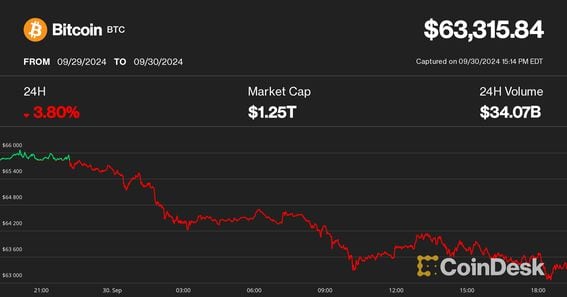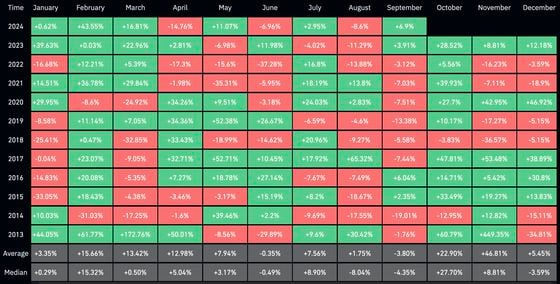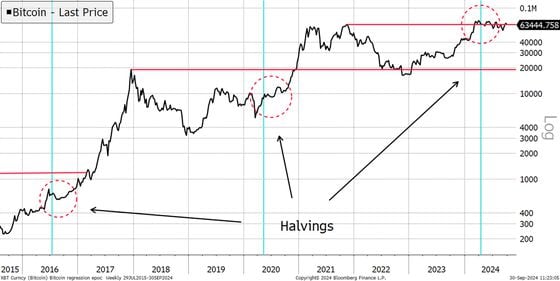
- Bitcoin dipped 3.7% over the past 24 hours while XRP, ADA, DOT and LINK plunged over 5%. SOL, ETH outperformed.
- Even with the decline, BTC is on track to finish September with a nearly 7% return, its best performance since 2013.
- ByteTree’s Charlie Morris contemplated whether the expectation for a strong October is so widespread that it may upend the trend.
Cryptocurrencies fell sharply on Monday with bitcoin (BTC) nearing the $63,000 level during the U.S. session, finishing on a sour note of what otherwise was a surprisingly stellar September for digital assets.
BTC dipped 3.7% over the past 24 hours, while ether (ETH) and solana (SOL) held up relatively well with 2.8% and 1.9% declines, respectively. Several altcoin majors in the broad-market CoinDesk 20 index tumbled more than 5% during the same period, including Ripple (XRP), Cardano (ADA), Polkadot (DOT) and Chainlink (LINK).
Crypto-related stocks also got slammed lower, with multiple bitcoin miners including Marathon Digital (MARA), Bitdeer (BTDR), Hut 8 (HUT) and CleanSpark (CLSK) plunging 5%-10%. Crypto exchange Coinbase (COIN) fell over 6%, while MicroStrategy (MSTR) was more than 3% lower shortly before the close of trade.
A look at traditional markets show U.S. equity indexes flatlined for most of the day before heading lower towards the later hours of the session, while key European markets sold off 1%-2%. Japan’s incoming prime minister Shigeru Ishiba said that “monetary policy must remain accommodative as a trend,” according to a Reuters report. His comments came after his surprise weekend elevation to the PM role set off a 5% plunge in the Nikkei on Monday.
In the U.S., Federal Reserve Chair Jerome Powell tempered expectations on Monday that future rate cuts will be as aggressive as September’s 50 basis point cut.
“Looking forward, if the economy evolves broadly as expected, policy will move over time toward a more neutral stance. But we are not on any preset course,” Powell said. “The risks are two-sided, and we will continue to make our decisions meeting by meeting.” “Overall, the economy is in solid shape,” he added. “We intend to use our tools to keep it there.”
When might bitcoin truly break out?
Even with today’s dip in crypto prices, bitcoin is on track to finish with a solid positive return in September despite its reputation for being an adverse month. BTC was up just shy of 7% through the month at prices a few hours before UTC midnight, booking its best September performance since 2013, per CoinGlass data.
September’s positive return could bode well for October, with every previous green September having been followed by more gains the next month. October is also historically one of the strongest months for bitcoin, earning its nickname “Uptober,” by recording positive monthly returns 9 times out of 11 since 2013.

However, Charlie Morris, founder of investment manager ByteTree, contemplated whether the expectation of a strong October is so widespread that it may throw a curveball to investors.
“The contrarian will always be cautious of an idea that has become too popular because popularity means the money is already invested ahead of the event,” Morris wrote in a Monday report.
His report further noted that BTC’s price historically consolidated for roughly six months after halvings before making new highs, and the current price action is in line with that pattern. Given that this year’s event happened on April 19, a breakout to new highs may happen towards the end of October if the pattern holds up.

Options traders, however, expect that a bigger rally will only come after the U.S. elections in November, and are thus positioning for further weakness in the coming weeks, according to Jake Ostrovskis, OTC trader at crypto market maker Wintermute.
“With spot trading dipping below $65,000, the volatility surface indicates a bias toward the downside until late October and November, when the market begins to favor calls over put protection,” Ostrovskis said. “Current positioning suggests support for a post-election rally.”
Edited by Stephen Alpher.

